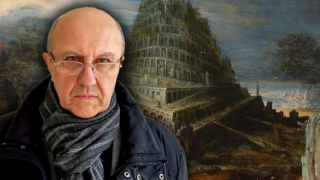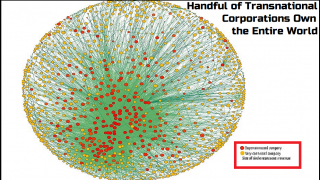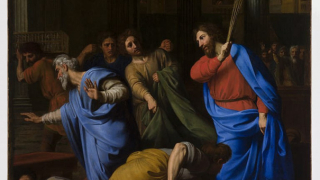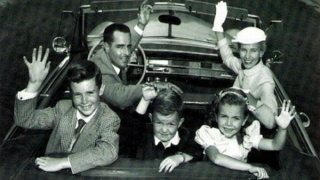Alain de Benoist – Against liberalism, society is not a market
“ Contre le libéralisme. La société n’est pas un marché.” Here is the new work by Alain de Benoist, presented below by its publisher, éditions du Rocher.
A liberal society is a society dominated by the primacy of the isolated individual, the ideology of progress, the ideology of human rights, the obsession with growth, the disproportionate place of mercantile values, the subjugation of the symbolic imaginary by the axiomatic [principle] of interest. Moreover liberalism has acquired a global scope since capital has instituted globalization as the real historical subject of modernity. It is the origin of this globalization, which is only the transformation of the planet into an immense market. It inspires what we call liberal-libertarian “singular thought”1today. And of course, like any dominant ideology, it is also the ideology of the dominant class.
Liberalism is a philosophical, economic, and political doctrine, and must be studied and judged as such. In this regard the old right-left divide is of little utility, because the moral left, forgetting socialism, has rallied to market society, while a certain conservative right never comes to the understanding that liberal capitalism systematically destroys everything it wants to conserve. This book intends to get to the essential, to the heart of liberal ideology, starting from a critical analysis of its foundations, that is to say an anthropology essentially founded on individualism and economism - the anthropology of Homo economicus.
Alain de Benoist, essayist and philosopher, is the author of over a hundred books addressing political philosophy and the history of ideas. He recently published Les démons du bien (2013), Survivre à la pensée unique (2015), Au-delà des droits de l’homme (2016), Le moment populiste, Ce que penser veut dire (2017) and Décroissance ou toujours plus? (2018).
Liberalism is firstly an “anthropological error”
Breizh-info.com: You published a new work entitled “Contre le Libéralisme. La société n’est pas un marché.” Why is it important to clarify from the introduction that you are rendering a critique of liberal ideology, and a not a plea for bureaucracy or an attack against the freedom to work, move, act, think, and free will?
Alain de Benoist: Those who know me would have a hard time, I believe, imagining me as an adversary of free will or a defender of bureaucracy! If I took the trouble of explaining, at the start of my book, that we must firstly attack the theoretical foundations of liberal ideology, it's firstly because it cannot be attributed to a single author. “Marxism” is entirely derived from Marx's thought, but liberalism has multiple “founding fathers,” which, for two centuries, has sometimes made it appear under very different aspects. The traditional distinction between political liberalism, economic liberalism, and philosophical liberalism further obscures things instead of clarifying them.
I think, like John Milbank, that liberalism is firstly an “anthropological error”, in plain language that its conception of man is erroneous. But it's this anthropology that we find at the base of all forms of liberalism: the idea of a man who isn't naturally social or political, who continuously seeks to maximize his private interest, the economic domain being the one in which he is supposed to be able to best enjoy his freedom. The liberal man is Homo economicus, a self sufficient being, the owner of himself, naturally indifferent to any notion of common good. That's what lead me to identify the two fundamental components of liberal anthropology: individualism and economism.
Breizh-info.com: You said that liberalism is the ideology of the dominant class. So would defending liberal ideology be comparable to bourgeois conservatism according to you?
Alain de Benoist: The dominant ideology is always the ideology of the dominant class. Today, the dominant class doesn't limit itself to bourgeois conservatives. It's a transnational class, perfectly in accord with deterritorialized capitalism, which deems itself both “efficient” and “progressive.” It works for the transformation of the planet into an immense market, but adheres to the ideology of human rights and the ideology of progress at the same time. This class progressively cuts itself off from the people, with all the consequences that we know. The bourgeoisie that deems itself both liberal and conservative clings to an untenable position. In fact, it can only affirm itself to be liberal at the expense of its conservatism and can only affirm itself to be conservative at the expense of its liberalism.
In my book I give a few examples of this inconsistency. How can you purport to regulate immigration while adhering to the liberal principle of free circulation of people, capital, and merchandise? How can you ban the use of narcotics without contradicting the liberal idea that everyone should be left entirely free to do what they want with themselves? How can you defend the identities of peoples and cultures if you only see them, like liberals, as simple aggregates of individual atoms? How can you conserve the “traditional values” that the capitalist system's limitlessness suppresses everywhere.
Liberalism, hostile to any form of sovereignty
Breizh-info.com: How is liberalism incompatible with participative democracy, while it is perfectly married to representative democracy?
Alain de Benoist: From a liberal point of view, the advantage of representative democracy is that it substitutes parliamentary sovereignty for popular sovereignty: as Rousseau saw well, in this system the people are only sovereign on voting day; the day after, it's the elected representatives who have the power to decide. The problem, today, is that representative democracy no longer represents anything. Thus the generalized defiance towards an oligarchic system completely cutoff from popular aspirations.
But we must not fool ourselves: liberalism, in the very measure where it advocates the submission of the political to the impersonal forces of the market, is actually hostile to any form of sovereignty. More exactly, the only sovereignty that it recognizes is that of the individual. Nations and peoples don't have an existence as such. As the very liberal Bertrand Lemennicier wrote, the nation is only a “concept without a counterpart in reality.” So any collective identity is fantasy. Methodological individualism, hostile to any form of holism, is thus the only means to analyze a society that “doesn't exist” as Margaret Thatcher said in all seriousness.
In the measure where participative democracy allows power to return to the people, thus being akin to the freedom of the Ancients, which consisted of giving the citizens the possibility of actively participating in public life (and not losing interest in it in order to seek refuge in the private) in contrast to the freedom of the Moderns, it can only collide with the opposition of liberalism.
Breizh-info.com: To echo the news, would you say today, Emmanuel Macron is the perfect figure of liberal ideology? For what reasons?
Alain de Benoist: We'll say that he's one of its emblematic figures. We know that it's the financial milieus that allowed Macron to come to power and that once elected, he hurried to form a government whose principal characteristic is to unite right wing liberals and left wing liberals. At least that allows us to note that, as Jean-Claude Michéa said and repeated, the economic liberalism of the “right” and the societal liberalism of the “left” are ultimately both derived forms of the same ideology – and they perfectly complement each other. But that also allows us to understand that the right-left divide is in the process of disappearing in order to be replaced with another, certainly more fundamental: liberals and anti-liberals. During the entire 19thcentury, until the appearance of socialism, conservatives were the principle adversaries of liberals. They are coming back to that.
Breizh-info.com: What antidotes, what alternatives exist or remain to be invented for our societies to triumph over this liberalism?
Alain de Benoist: There is evidently no miracle recipe. On the other hand there is a general situation which evolves increasingly faster, and which henceforth demonstrates the limits of the current system well, meaning the political system of liberal democracy or the economic system of Form-Capital2confronted with the immense threat of a general devaluation of financial value. The future is for the local, for small scale production, for the rebirth of human communities, for direct democracy, for the abandonment of exclusively mercantile values. The antidote will be found when citizens discover that they are not only consumers, and that life can be more beautiful when they repudiate a world where nothing has value, but everything has a price.
Interviewer: Yann Vallerie
Notes
1) The original French term « pensée unique »is difficult to translate exactly, under the rule of « pensée unique »everyone must think the same. « Pensée unique » can be compared to « monnaie unique », « marché unique », « Dieu unique », etc. It is a mix of political correctness and Orwellian “newspeak”: what everybody is supposed to think must conform to the dominant ideology.
2) Form-Capital, an expression proposed by the French philosopher Gérard Granel, refers to the idea that capitalism is not only an economic system but also has an implicit anthropological and social dimension. The sociologist Marcel Mauss spoke about a “total social fact” or “total / global social system.
Source: https://www.breizh-info.com/2019/02/04/111329/liberalisme-alain-de-benoist-souverainete













